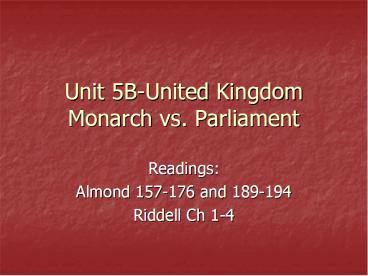Unit 5BUnited Kingdom Monarch vs. Parliament
1 / 15
Title: Unit 5BUnited Kingdom Monarch vs. Parliament
1
Unit 5B-United Kingdom Monarch vs. Parliament
- Readings
- Almond 157-176 and 189-194
- Riddell Ch 1-4
2
Guiding Questions
- What constitutes government in the British
system? - What is the role of the PM? Cabinet?
- What is the role of the Commons? Lords?
- Is the British parliament weak?
3
British Government
- Crown symbolizes governmental authority.
- Government vs. regime.
- Whitehall-location of executive agencies.
- 10 Downing Street-Residence of the PM.
- Parliament is housed at Palace of Westminster.
4
Palace of Westminster
5
Responsibilities of a PM
- First among equals in the cabinet.
- Performance/emphasis has varied amongst PMs.
- 1) Winning elections.
- 2) Media campaigning.
- 3) Maintain confidence of party.
- 4) Perform well in parliament.
- 5) Balance domestic and international politics.
6
Cabinet
- Consists of senior ministers chosen from either
the Commons or the Lords. - Decisions have been increasingly centralized in
PMs office. - Once a decision is reached, all must support it
publicly. - Ministers responsible for day-to-day functioning.
7
Role of Parliament-Commons
- Divided between the government and the
opposition. - Party discipline is extremely high in the
Commons. - Government controls budget/policy MPs support
or oppose. - Executive dominant.
8
House of Commons-Lower House
- PM is drawn from Commons.
- Most ministers are drawn from the Commons.
- 1) debates matter for forming political
reputations. - 2) government backbench MPs have access to
ministers. - 3) publicize issues via local/national media.
- 4) debates force discussion on legislation.
- 5) scrutinize government decision-making.
9
House of Commons-Elections
- 646 Districts.
- Constituency parties nominate.
- SMD/FPTP electoral system.
- System over-represents large parties
10
General Election 2005
- Election results
- Labour, Conservatives, Liberal Democrats and UKIP
contest most seats. - Smaller parties do win sizeable portions of the
vote. - Labour and Conservatives strong in Wales and
England. - Labour and Lib Dems in Scotland.
- Northern Ireland has separate parties.
- Lib Dems as the protest vote.
11
House of Commons-Parties
- Labour 352
- Conservatives 196
- Liberal Democrats 63
- SNP/PC 9
- Northern Ireland 18
- Others 8
- GOVN MAJORITY 67
12
House of Lords-Upper House
- Refining legislation.
- Representation of the Church of England.
- Highest appeals court.
- Debates less politically charged.
- Can be overruled by Parliament Acts.
- Salisbury Convention.
13
House of Lords-Composition
- 26 Bishops
- 26 Law Lords
- 92 Hereditary peers
- 606 Life peers
- Bishops selected by Church, retire at 75.
- Law Lords serve until 70.
- Hereditaries elected.
- Life peers appointed by PM or Commission.
- Reform Commons wants elected Lords want
appointed.
14
House of Lords-State of the Parties
- Labour 211
- Crossbench 208
- Conservative 204
- Liberal Democrat 77
- Bishops 26
- Other 12
- Leave of Absence 12
15
Next Lecture
- PMs Questions
- Is parliament declining?
- Thatcherism
- Blairism
- Almond
- Finish Riddell































